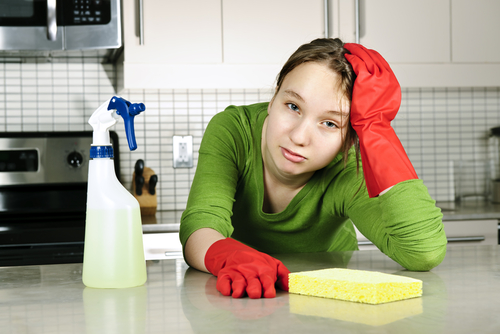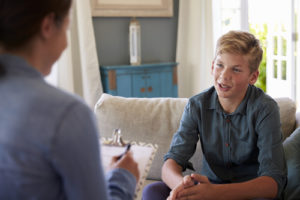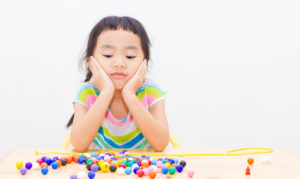
“My kid is a little OCD.”
A teacher recently told us about hearing a parent utter these words. A lot of people use this or similar verbiage, it turns out, to describe quirks or mannerisms which mimic Obsessive Compulsive Disorder or OCD. People may use this kind of phrase to describe someone who seems to need everything in life to be “just so,” a child or loved one who is meticulous in their order of things and goes beyond the pale in their perceived perfectionism, even (especially) when it comes to the smaller details.
Can one truly be “a little” OCD? It is a disorder, after, all, one that requires diagnosis from a professionally trained practitioner. While many of us do, from time to time, exhibit the occasional symptom that parallels OCD, only a fraction of people (children and adults both) legitimately have this disorder. Youth counsellors do treat patients with OCD, particularly when it is accompanied by other mental health issues such as depression, anxiety, etc. Let’s explore what OCD is, why it’s become a mainstream term, and how to deal with the issues that plague a child or teen who’s been diagnosed with OCD.
OCD over the years: How this disorder has produced genius but has also been misunderstood
OCD is not a new phenomenon to psychology nor to youth counselling. Once known as Obsessive Compulsive Neurosis, OCD’s history dates back 500 years or more. Early on OCD was seen as an “obsessive doubting” of sorts. In 1621 the Don of Oxford said, “If he be in a silent auditory, as at a sermon, he is afraid he shall speak aloud and unaware, something indecent, unfit to be said.” The Bishop of Norwich went further, saying “naughty, and sometimes Blasphemous Thoughts [which] start in their Minds, while they are exercised in the Worship of God [despite] all their endeavours to stifle and suppress them … the more they struggle with them, the more they increase.”
OCD: The ongoing struggle
“Struggle” is an appropriate word to describe OCD. It’s bad enough as an adult afflicted with this disorder, struggling with symptoms such as:
- Having repeated thoughts, images, and urges about a wide range of issues; perceived as being compulsively neat and organized; fearing germs, dirt, contamination, intruders, or violence; or imagining hurting loved ones or committing sexual acts or behaving in a way that conflicts with religious beliefs
- Engaging in repetitive behavior such as washing hands, locking and unlocking doors, counting, keeping unneeded items (hoarding), or repeating the same steps to any task again and again
- Having obsessions that are intrusive and compulsions that often feel out of the person’s control but dictated by a rule that must be applied rigidly
- Deriving little if any pleasure from engaging in these rituals (though deriving some relief from the anxiety the thoughts cause)
- Spending at least an hour a day on the thoughts and rituals, a cause of distress and making daily life difficult to manage
Imagine, then, being a child and feeling plagued by many or all of these things! Youth is challenging enough, without these added obstacles getting in the way. That’s how children and their parents often end up at our offices here at Capital Choice Counselling in Ottawa. Children or teens find themselves subconsciously but painstakingly undergoing rituals or patterns of behaviour that they can’t explain. They feel confused and frustrated by the ongoing challenges of OCD, and are looking for answers on how to deal with this uncomfortable disorder.
The balance between frustration and genius in OCD
We like to say that not all hope is lost. In fact, a number of historic figures are thought to have had OCD throughout time, people such as Martin Luther, Charles Darwin, Dr. Samuel Johnson, Howard Hughes, Katherine Hepburn and many others. Modern-day celebrities and pop icons with OCD include Howie Mandel, Lena Dunham, Leonardo DiCaprio (who played Howard Hughes in the biopic), Justin Timberlake and Jessica Alba, to name but a few.
Still, the frustrations are clear.
How OCD can be devastating for youth
If a person – especially a child – has constant thoughts of anything dominating his or her head, it would be difficult to carry out functions such as school or work. When the thoughts are obsessive and narrowed in on rituals and behaviour – in other words action – the challenges begin to mount quickly.
It’s one thing to have obsessive thoughts. Painful enough for a child or adolescent, to be sure. But exhibiting obsessive-compulsive behaviour takes things to another dimension. Now it’s on public display, after all, and quickly becomes a hardship for the OCD sufferer. We know that youth can be quite relentless in zeroing in on a victim. Bullying is a huge problem for the child or teen with OCD, and being an outcast or perceived as “weird” and “not like the others” is about as painful as youth emotions get.
What kinds of symptoms do children or teens with OCD tend to exhibit?
- Excessive cleaning and/or handwashing
- Ordering and arranging things in a particular, precise way
- Repeatedly checking on things, such as repeatedly checking to see if the door is locked or that the oven is off
- Compulsive counting
Some OCD patients can also present a tic disorder. Motor tics are sudden, brief, repetitive movements, such as eye blinking and other eye movements, facial grimacing, shoulder shrugging, and head or shoulder jerking. Vocal tics might include repetitive throat-clearing, sniffing, or grunting sounds.
Children with OCD may not realize that their behaviour is unusual – that’s natural, when you think about, since this is pretty much all they know. It’s only when people outside the home begin to point this out that the child or adolescent with OCD begins to feel different, feel ashamed or embarrassed. OCD frequently is associated with depression, anxiety, ADD / ADHD, and many other conditions of mental and emotional health. The OCD sufferer may resort to drugs or alcohol to seek relief. Suicide attempts are also not unheard of.
Who is at risk?
It’s thought that a genetic risk for OCD could be a factor. If OCD exists elsewhere in the family, this could help facilitate a diagnosis in a child or teen exhibiting symptoms of OCD. Victims of childhood trauma, particularly physical or sexual abuse as a child, are said to be at higher risk of disorders such as OCD. Brain structure could also be a factor, but this is still in the research stages.
Treatment for OCD: Keeping Hope Alive
The goals for children, adolescents or teenagers who struggle with OCD-like symptoms are:
- Make a proper and thorough diagnosis
- If that diagnosis is OCD, then treatment must follow
While some argue for medication and others urge psychotherapy, there is consensus in the mental health community that a combination of both medication and therapy are helpful in treating youth with OCD.
Medication includes selective serotonin reuptake inhibitors (SSRI), more commonly in the form of Zoloft, Celexa, Prozac, Paxil and others. Since these are also effective in the treatment of depression, that can tackle multiple symptoms and lead to a quicker and more effective recovery.
At the same time, it is very important that children, adolescents or teens who have been diagnosed with OCD seek and continue with a program of therapy.
One of the most effective forms of therapy in the treatment of OCD is cognitive behavioral therapy or CBT, the subject of a previous article by Capital Choice Counselling. With CBT, a young patient deliberately and voluntarily confronts his or her obsessions and compulsions. At the same time, the therapist gives support and structure, strongly encouraging the patient to refrain from using rituals or avoidance.

How can you help your son or daughter with OCD?
Once you have gotten a diagnosis for your child or teen that shows sufficient evidence for OCD, the next steps are focused around support. Family and friends are vital in the recovery of a child with an anxiety disorder. It’s important to be supportive and avoid perpetuating your loved one’s symptoms. Don’t trivialize the disorder or make unreasonable expectations for rapid improvement. When a family member suffers from obsessive-compulsive disorder, it’s helpful to be patient about any progress and acknowledge successes – knowing that they’re making progress is important for your daughter or son with OCD.
To find out more about therapy options in Ottawa for youth with OCD, contact Capital Choice Counselling today. We can connect you with a youth counsellor near you, someone who is experienced with OCD and understands the added challenges facing children and teens with OCD.

